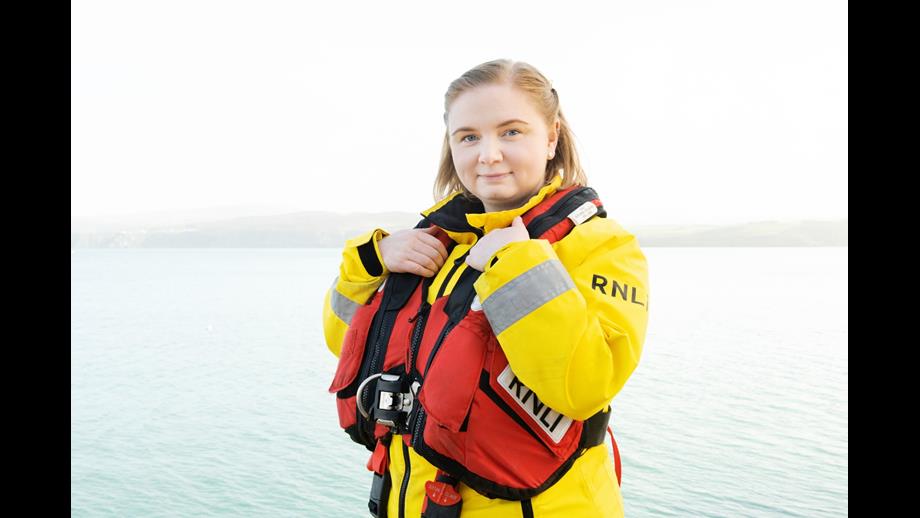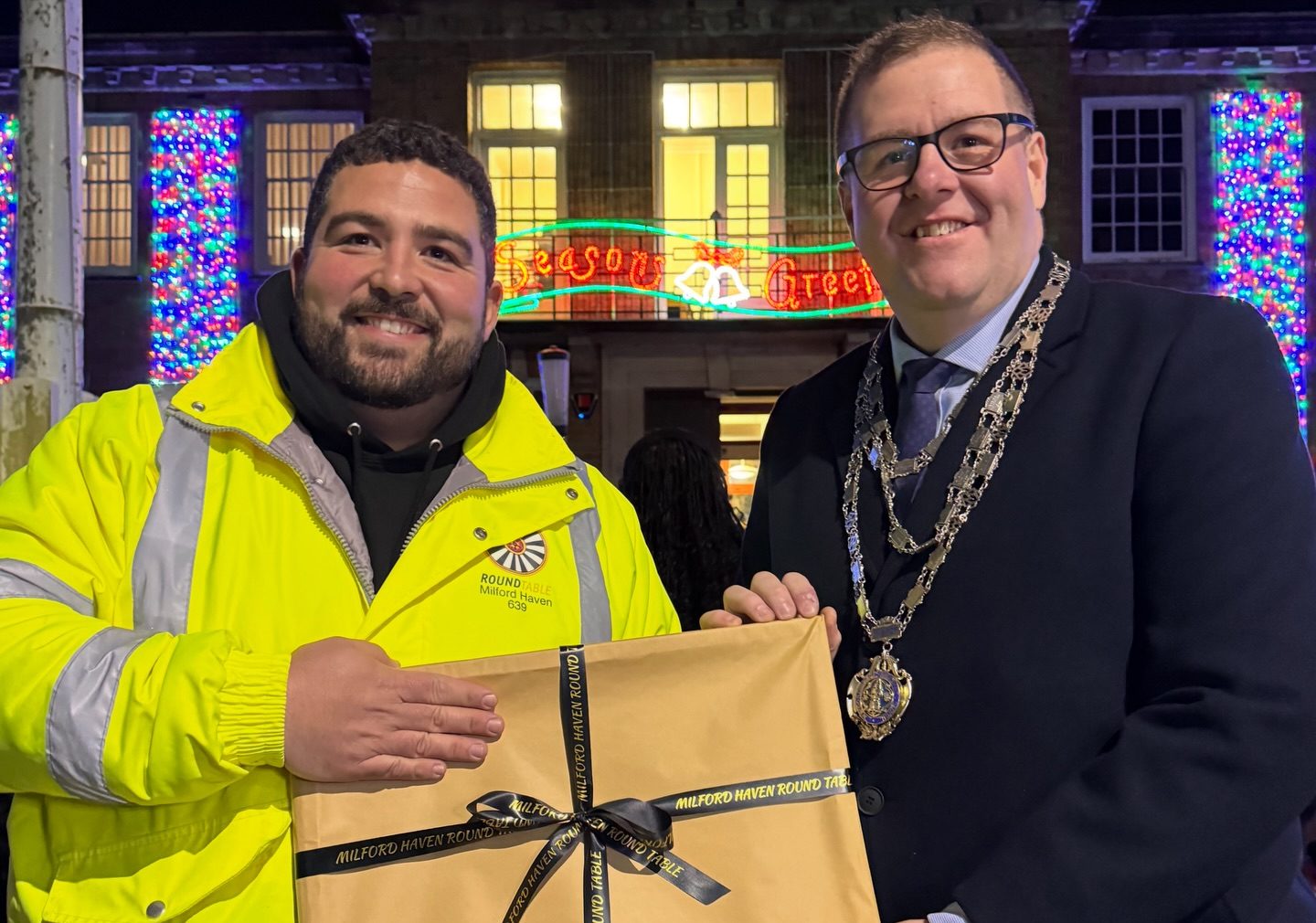Charity
200 hours at sea in RNLI’s 200th year for Fishguard volunteer

A FISHGUARD RNLI volunteer has become the first crew member at the station to clock 200 hours at sea in 2024, the RNLI’s bicentenary year.
Jessica Rogers, who joined the crew in September 2021, serves on Fishguard’s Trent-class all-weather lifeboat Blue Peter VII and the D-Class inshore lifeboat Edward Arthur Richardson.
This year has been a milestone for Fishguard RNLI, with over 30 service launches, the addition of a full-time coxswain, and the introduction of a tiered training scheme. Jessica’s achievement highlights the station’s commitment during this historic year, which marks 200 years since Sir William Hillary founded the RNLI.
Jessica has excelled in her training, achieving Tier One and Tier Two crew qualifications for both lifeboats, enabling her to operate as a fully competent crew member on either vessel. She is now advancing her skills as a helm and navigator. Her dedication has resulted in over 200 recorded hours at sea—the highest seen at the station in eight years.
These hours include 35 hours responding to 15 rescue shouts, with the remainder dedicated to training, including supporting other crew members during exercises. Beyond her sea hours, Jessica contributes as the station’s Lifeboat Training Coordinator, ensuring all crew training is up to date.
Professionally, Jessica is a self-employed podiatrist in Fishguard. Her clients are familiar with her RNLI commitment, with lifeboat news often a topic of conversation during appointments. On occasion, her pager has gone off mid-treatment, requiring her professional judgement to prioritize her clients’ safety before responding to a shout.
Jessica’s milestone coincides with the RNLI’s 200th year, showcasing the dedication of volunteers who have supported the lifesaving charity for two centuries. While Jessica is the first to surpass 200 hours at Fishguard in 2024, a handful of other crew members are expected to achieve this milestone by year-end.
Earlier this year, Jessica, her husband Cedwyn Rogers, Florian Caroff, and Jake Thomson were recognized for completing 100 hours at sea, each receiving commemorative glassware crafted by full-time coxswain Gemma Gill. Gemma is now creating a special memento to mark Jessica’s 200-hour achievement.
Gemma Gill, full-time coxswain at Fishguard RNLI, said: “I am incredibly proud of our team, especially Jess for reaching this significant milestone during the RNLI’s bicentenary. Jess’s 200 hours afloat are just part of her contribution—she’s also dedicated countless hours to training, fundraising, and community events. Thank you, Jess, and all our Fishguard crew, for your unwavering commitment.”
Jessica Rogers reflected on her achievement: “I was surprised to learn I’ve spent so much time at sea this year! I love being part of the Fishguard crew, and as they say, time flies when you’re having fun.
This milestone isn’t just my achievement—it’s thanks to the hard work of RNLI staff and volunteers, as well as the generous support of our donors. I look forward to continuing my training and becoming an even more valuable crew member in the years ahead.”
Fishguard RNLI’s year of milestones underscores the dedication of its volunteers and the enduring legacy of the RNLI in saving lives at sea.
Charity
NSPCC Cymru launches Baby Steps scheme to support new parents across Wales

New perinatal service aims to help families cope with the pressures of early parenthood
NSPCC CYMRU has launched a new perinatal support programme aimed at helping expectant and new parents across Wales navigate the challenges of caring for a baby.
The Baby Steps service, a redeveloped early-intervention programme, is designed to give parents the tools, confidence and emotional support needed during pregnancy and in a child’s first months of life.
The service was officially launched this week at an event held at BT headquarters in London, attended by The Duchess of Edinburgh, who is a Patron of NSPCC, alongside childcare professionals and public figures.
Baby Steps will initially be piloted through three NSPCC hubs, including the Wales hub, placing Cymru at the forefront of the charity’s rollout of the service.
Carl Harris, Assistant Director for the NSPCC Wales hub, said the evidence-based programme could make a significant difference to families during a crucial stage of a child’s development.
He said: “The early stages of a baby’s life can feel daunting for parents, as they face new challenges every day while trying to give their child the best possible start.
“It is a critical time for a child’s development, and perinatal services like Baby Steps can offer enormous support to help parents through what is an exciting, but sometimes very difficult, period.
“NSPCC Cymru is proud to be leading the way in rolling out this service and supporting parents and children across Wales.”
Figures released alongside the launch highlight the scale of need. During 2024/25, the NSPCC Helpline referred more than 3,800 children under the age of two to external agencies across the UK, including police and social services. This represented almost one fifth (18%) of all referrals made by the Helpline on behalf of a child during the year.
One father who contacted the service described the pressures faced by new parents, saying: “We just can’t get our baby into a routine. It’s been eight weeks, we’re new to parenting and have different opinions, and then our friends all have different advice. It’s causing major arguments and nothing’s working.”
In addition to Baby Steps, the NSPCC website offers a wide range of guidance for parents and carers, including advice on bonding with babies and raising children safely.
Chris Sherwood, Chief Executive of the NSPCC, said the charity was pleased to mark the launch with a royal visit.
He said: “It’s always a privilege to be part of a Royal visit, and we were delighted that HRH The Duchess of Edinburgh was able to join us to celebrate our Baby Steps service.
“As our Helpline data shows, the first couple of years of a child’s life can be an extremely difficult time for parents. Our Helpline regularly hears from parents struggling with the pressures of a newborn, as well as from concerned members of the community.
“The Baby Steps service provides essential building blocks to help parents navigate the earliest stages of their child’s life and ensure they thrive. Any parent or carer who needs support or advice can always contact the NSPCC Helpline.”
.
Charity
Milford Haven Round Table thanks town council for backing major community events

MILFORD HAVEN ROUND TABLE has formally thanked Milford Haven Town Council for its continued support, saying the council’s backing helps make some of the town’s biggest free events possible.
The group said the Town Council is a major supporter of its work in Milford Haven and plays a vital role in enabling community celebrations including the Milford Haven Carnival and the annual Fireworks Extravaganza, which draw thousands of people.
Representatives from the Round Table said it was “great to catch up” with the Mayor, Councillor William Elliott, at the Christmas Lights Switch On in December, where they presented a small token of thanks to mark another year of collaboration.
Milford Haven Round Table said it is proud to support the town through fundraising, volunteering and delivering events which create memories, raise money for local causes and strengthen community spirit.
The group added that none of its work would be possible without strong partnerships across Milford Haven, and thanked the Town Council for its “ongoing support, trust and commitment” to the town and its residents.
Charity
Local car enthusiast donates treasured classic to Paul Sartori Hospice at Home

THE PAUL SARTORI FOUNDATION is celebrating an act of generosity from local classic car enthusiast Roger Handcock, whose donation of a cherished Mazda MX5 has helped raise £5,500 plus Gift Aid for end-of-life care across Pembrokeshire.
Roger made the decision to donate his 1990 MX5 after a period of ill health over the summer meant the car was no longer being driven. He said he wanted it to be enjoyed — and properly cared for — by someone who would appreciate it as much as he had.
A long-standing member of the Pembrokeshire Classic Car Club, Roger said: “I was ill this summer and my 1990 MX5 was not getting any use, so I decided to part with it in the hope that it would bring some enjoyment and be maintained properly. However, I didn’t have the energy to try to sell it for the highest possible price.
“Being a member of Pembrokeshire Classic Car Club, I decided to donate the car to Paul Sartori Hospice at Home which is one of their favoured charities. In the end a great price was secured for the vehicle, and I am pleased to say that it will still be seen on Pembrokeshire’s roads.”
The Foundation said donations like Roger’s provide a vital source of income, helping to fund free hospice at home support for people nearing the end of life. The service enables patients to remain in the comfort of their own homes, supported by specialist equipment and professional care, while also offering help to families at an incredibly difficult time.
A spokesperson for the Paul Sartori Foundation said they were grateful for Roger’s kindness, adding that the impact of his gift would continue long after the MX5 begins its next chapter on Pembrokeshire’s roads.
Brave donation: Roger Handcock with Paul Sartori Events and Fundraising Officer Joanne Lutwyche (Pic: Paul Sartori Foundation).
-

 Health4 days ago
Health4 days agoConsultation reveals lack of public trust in health board
-

 News5 days ago
News5 days agoCaldey still unsafe, survivors warn — despite Abbey’s reform claims
-

 Community5 days ago
Community5 days agoPembrokeshire students speak at national Holocaust Memorial Day event
-

 Local Government7 days ago
Local Government7 days agoTribunal over former Neyland councillor’s conduct adjourned
-

 News5 days ago
News5 days agoKurtz raises Gumfreston flooding in the Senedd as petition deadline nears
-

 Crime6 days ago
Crime6 days agoMan denies murdering brother as jury hears of ‘ferocious attack’ at Morriston flat
-

 Community4 days ago
Community4 days agoCampaign to ‘save’ River Cleddau hits over 2,200 signatures
-

 Community6 days ago
Community6 days agoStorm Chandra: Morning impacts across Pembrokeshire























